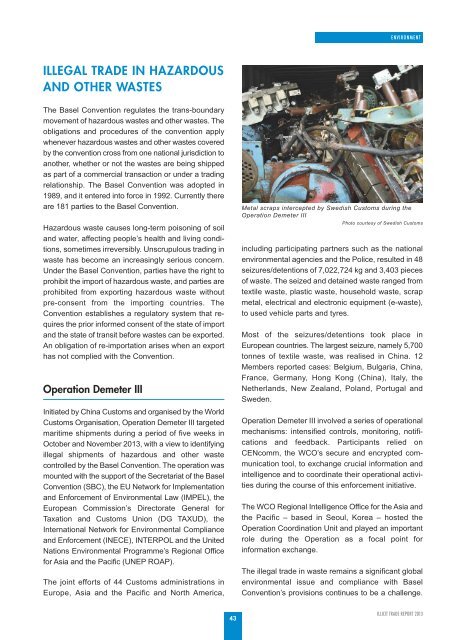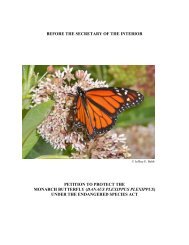Create successful ePaper yourself
Turn your PDF publications into a flip-book with our unique Google optimized e-Paper software.
ENVIRONMENT<br />
ILLEGAL TRADE IN HAZARDOUS<br />
AND OTHER WASTES<br />
The Basel Convention regulates the trans-boundary<br />
movement of hazardous wastes and other wastes. The<br />
obligations and procedures of the convention apply<br />
whenever hazardous wastes and other wastes covered<br />
by the convention cross from one national jurisdiction to<br />
another, whether or not the wastes are being shipped<br />
as part of a commercial transaction or under a trading<br />
relationship. The Basel Convention was adopted in<br />
1989, and it entered into force in 1992. Currently there<br />
are 181 parties to the Basel Convention.<br />
Hazardous waste causes long-term poisoning of soil<br />
and water, affecting people’s health and living conditions,<br />
sometimes irreversibly. Unscrupulous trading in<br />
waste has become an increasingly serious concern.<br />
Under the Basel Convention, parties have the right to<br />
prohibit the import of hazardous waste, and parties are<br />
prohibited from exporting hazardous waste without<br />
pre-consent from the importing countries. The<br />
Convention establishes a regulatory system that requires<br />
the prior informed consent of the state of import<br />
and the state of transit before wastes can be exported.<br />
An obligation of re-importation arises when an export<br />
has not complied with the Convention.<br />
Operation Demeter III<br />
Initiated by China Customs and organised by the World<br />
Customs Organisation, Operation Demeter III targeted<br />
maritime shipments during a period of five weeks in<br />
October and November <strong>2013</strong>, with a view to identifying<br />
illegal shipments of hazardous and other waste<br />
controlled by the Basel Convention. The operation was<br />
mounted with the support of the Secretariat of the Basel<br />
Convention (SBC), the EU Network for Implementation<br />
and Enforcement of Environmental Law (IMPEL), the<br />
European Commission’s Directorate General for<br />
Taxation and Customs Union (DG TAXUD), the<br />
International Network for Environmental Compliance<br />
and Enforcement (INECE), INTERPOL and the United<br />
Nations Environmental Programme’s Regional Office<br />
for Asia and the Pacific (UNEP ROAP).<br />
The joint efforts of 44 Customs administrations in<br />
Europe, Asia and the Pacific and North America,<br />
Metal scraps intercepted by Swedish Customs during the<br />
Operation Demeter III<br />
Photo courtesy of Swedish Customs<br />
including participating partners such as the national<br />
environmental agencies and the Police, resulted in 48<br />
seizures/detentions of 7,022,724 kg and 3,403 pieces<br />
of waste. The seized and detained waste ranged from<br />
textile waste, plastic waste, household waste, scrap<br />
metal, electrical and electronic equipment (e-waste),<br />
to used vehicle parts and tyres.<br />
Most of the seizures/detentions took place in<br />
European countries. The largest seizure, namely 5,700<br />
tonnes of textile waste, was realised in China. 12<br />
Members reported cases: Belgium, Bulgaria, China,<br />
France, Germany, Hong Kong (China), Italy, the<br />
Netherlands, New Zealand, Poland, Portugal and<br />
Sweden.<br />
Operation Demeter III involved a series of operational<br />
mechanisms: intensified controls, monitoring, notifications<br />
and feedback. Participants relied on<br />
CENcomm, the WCO’s secure and encrypted communication<br />
tool, to exchange crucial information and<br />
intelligence and to coordinate their operational activities<br />
during the course of this enforcement initiative.<br />
The WCO Regional Intelligence Office for the Asia and<br />
the Pacific – based in Seoul, Korea – hosted the<br />
Operation Coordination Unit and played an important<br />
role during the Operation as a focal point for<br />
information exchange.<br />
The illegal <strong>trade</strong> in waste remains a significant global<br />
environmental issue and compliance with Basel<br />
Convention’s provisions continues to be a challenge.<br />
43<br />
ILLICIT TRADE REPORT <strong>2013</strong>




